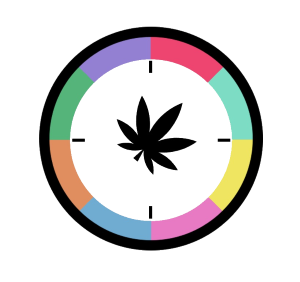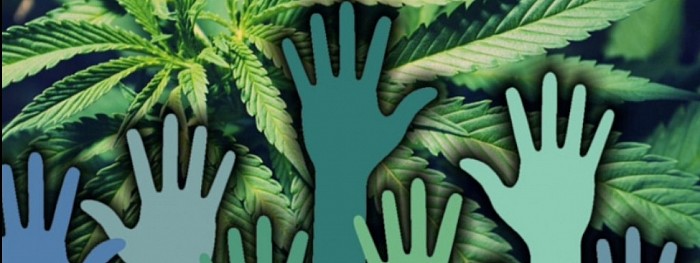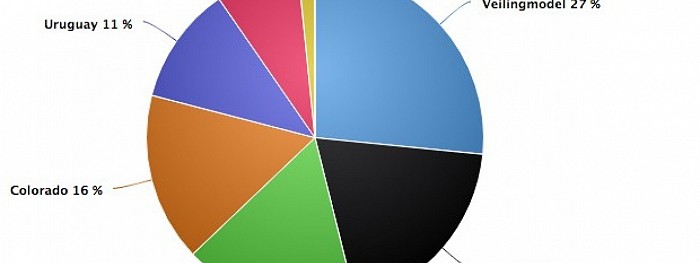Our method
With this test we have tried to elucidate the most prevailing regulation models currently in use troughout the world. Eight states of the United States, Uruguay and Jamaica are working on developing or implementing new laws that should end the War on Drugs and focus on pulic health, at this moment.
We are a group of civillians with different alliances who try to aquire insight into the different ways in which marijuana could be regulated. Some of the strict proposals we heard about in the Netherlands were already found problematic in other countries. The same issue we found with some of the more liberal proposals.
Unfortunately, in the national debate in the Netherlands the discussion usually stranded in a standof between regulation and doing nothing at all!
We wanted to trancend this discussion because we saw that the prohibition of marijuana is plagued by obvious problems. There are strong indications that the Dutch policy has no positive influence on the supply side but does have a number of negative consequences for the society. It creates unnessesairy humanitarian and economical costs, while the stated intentions of the policy can also be attained without forced evictions and billions of hard earned money flowing into the black market.
This is why we left the prohibition from the debateble models. It is not an option in the questions in the test. This way we streer the discourse toward the 'how' question instead of the 'if' question.
We also are full of questions about the best way to move forward. There are a lot of options to choose from. All help is welcome in thinking about effective and just laws that regulate an activity that invloves risks. Risks are regulated all the time. Think of mini-drones, windsurfing or driving a car.
A new debate
What rests is a conversation about what rules society would like to see. In this arena there is a lot to discuss. How old do you need to be? Who may sell it? How much tax should be levied? So many questions that are being pondered elsewhere in the world but not here.
We have taken these issues and boiled them down into eight quetions. Then we set out to look for the different answers that we could find. This resulted in a general view on how other countries dealed with them.
Some questions didn't make it into the test. Like the question if concentrates would be regulated. These models did not have answers or did not differ from each other on this question. It is an issue in itself, so it seems.
A question was added aswell: Who should check the new market? We found that different insights about this issue are available.
In the end we had these eight models were the hole production chain is regulated. For instance, we left out Washington DC, because it is a half-regulated system, just like the Dutch system.
About the models
Uruguay
This country has regulated marijuana trough a strong and strict government role, but is light-legged about age requirements and taxing. We have weighted this role of the government heaviest in the attribution of points in the test.
Colorado
The epicentrum of the legalisation movement according to American capitalistic values. Here we modulated the weight of the age question as well because in the Netherlands the standard age for drinking and other stimulants is 18, not 21.
Washington State
Almost identical to Colorado, exept for stricter laws for growing at home.
Jamaica
The regulation in Jamaica is not an all encompassing system of rules. The direction is not entirely clear and the implementation is step by step. People expressing doubt in some of the more complex questions therefore get extra point for this model.
The Doedemodel
Doede the Jong is the Netherlands most famous activist within the regulation movement. His model is of such originality that it contrasted significantly with the others. While still just an idea, we found it a worthy contribution for inclussion in our test.
Social Clubs
In the general policy debate Social Clubs have an important role in representing consumers, but in this test the format looks rather conservative, because of the members-only aspect of this model. Social Clubs are experiments with the law, excecises in claiming your rights, but therefore in the context of regulation they come off as rather retentive.
The auction model
Why not expand the current Dutch model with a kind of agency, The Legalize! Foundation asked? It transpired that keeping the current system but extending it with a new module between the legal and illegal parts was not yet a model onto itself. Other, comparable models where found not to fit in with the other questions.
California 1996
After combining all questions and models we thought there clearly lacked a model that had a medical focus on the supply side, and a free market implementation on the demand side of things. We found this system in California, where in 1996 medical marijuana was regulated. In the decades that passed this marked has become a fusion between medical and recreational use. The unavaidable haziness of this situation has led to the decision to build a new model for the market that presumably will look a lot like Colorado.








